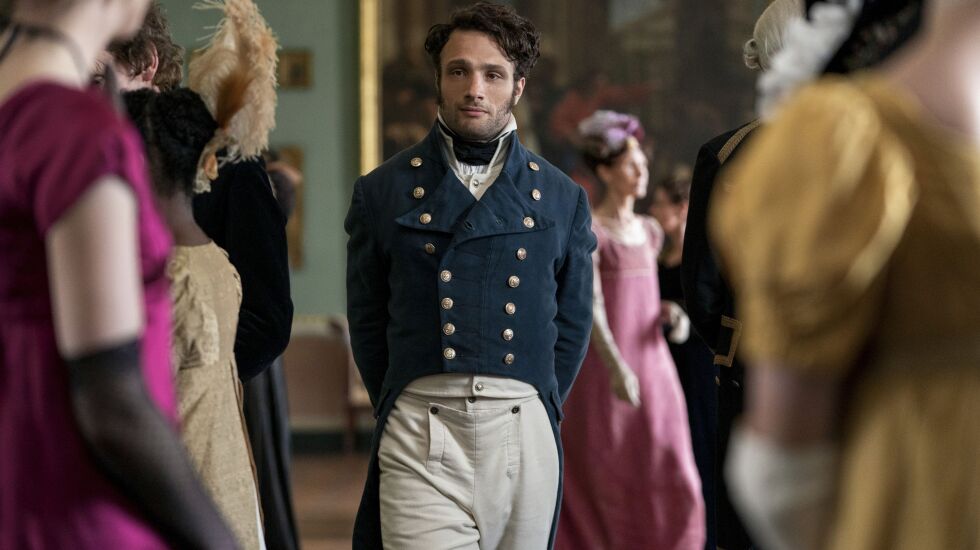
“If you’re a five in London, you’ll be a 10 in Bath.” – A line from the Netflix version of “Persuasion” that I’m pretty sure wasn’t in the original novel by Jane Austen.
We’ve seen dozens of historically accurate, carefully delivered adaptations of Jane Austen novels on screens big and small through the decades — and a fair share of cheeky, modern and/or irreverent takes on the material, what with “Clueless” (1995) and “Bridget Jones’s Diary” (2001) and “Pride and Prejudice and Zombies” (2016) and this year’s “Fire Island.” Only the purest of the purists could still claim outrage or offense over new twists on 19th century stories, whether the source material is Austen or Dickens (“The Personal History of David Copperfield”) or relatively recent literature, e.g., “Bridgerton” and “Mr. Malcolm’s List.”
Now comes the Netflix movie “Persuasion,” and unlike the 1960 BBC miniseries or the 1971 ITV miniseries or the 1995 movie or the 2007 movie, it’s filled with diverse casting and 21st-century terminology and such (admittedly overused) gimmicks as the lead character breaking the wall to address us directly or give us a look that says, “You see what I’m dealing with here?” While the veteran British theater director Carrie Cracknell and the production design team deliver period-piece accurate visuals, the screenplay by Ronald Bass (“Waiting to Exhale,” “Rain Man”) and Alice Victoria Winslow adheres to the main themes and storylines of the Austen novel but also peppers the dialogue with 21st century terminology and rhythms.
Does it come across as a bit precious at times? Yes. Is it particularly groundbreaking? No. Am I going to ask and answer one more question here and tell you if this is a light and breezy confection with delightful performances?
You betcha.
Sounding not quite British but definitely like an American actress doing a fairly good British accent, Dakota Johnson makes for an immensely charming and sympathetically flawed Anne, who has reached the shockingly advanced age of 27 without marrying. Anne blew her shot at happiness at 19, when she was, well, persuaded to dump the handsome and noble Frederick Wentworth (Cosmo Jarvis), who was a sailor without rank and thus deemed unworthy of Anne’s lasting affections.
Big mistake, Anne. Huge.
Cut to some eight years later, as Anne’s ludicrously narcissistic father, Sir Walter Elliot (Richard E. Grant in a hilarious turn) has fallen on tough financial times due to his irresponsible spending and must rent out the sprawling family mansion known as Kellynch Hall and take up residence in a relatively modest house in Bath. While Sir Walter and eldest daughter Elizabeth (Yolanda Kettle) set off for Somerset, middle daughter Anne stays behind to look after her married, cartoonishly self-involved, hypochondriac younger sister Mary (a very funny Mia McKenna-Bruce), who is always convinced she’s dying even though she’s perfectly fine.
Sample exchange between Mary and her sister-in-law:
“How are you feeling, Mary?
“You haven’t even asked me how I’m feeling!”
“I just did.”
“I’m so close to death, I can feel my organs decomposing.”
“Same as yesterday then.”

As fortune (good or bad, it remains to be seen) would have it, the new tenants at Kellynch Hall are Frederick’s older sister and her husband, which means Frederick will conveniently become a frequent guest. And get this: Poor old Frederick rose through the ranks during the wars against France and has also accumulated a considerable amount of wealth. Now he’s a real catch in every way, Anne! You blew it!
“Eventually you find yourself wondering, how did I end up here?” says Anne as she strokes her comfort bunny. (That’s not a euphemism; she has a pet rabbit.)
“A heartbeat ago, there were no two souls more in rhythm than Wentworth and I,” continues Anne, paraphrasing Austen’s prose from the novel. “Now, we’re strangers. Worse than strangers. We’re exes.”
Later, after the two have gotten over the awkwardness of seeing each other again and Frederick tries to smooth things over, Anne tells us, “Now we’re worse than exes. We’re friends.”
All the familiar locales (e.g., the cliffs and shores of Lyme Regis) and characters are eventually introduced to the proceedings. Henry Golding is suitably calculating and nebulous as Anne’s distant cousin, Mr. Elliot, who is in line to inherit the family estate, while Nia Towle is lovely and charming as the flighty but goodhearted Louisa, who finds herself falling for Frederick. This version of “Persuasion” isn’t so revolutionary as to rewrite the ending; it just gives us the modern ballad “Quietly Yours” by Birdy to accompany the unabashedly romantic conclusion. The film winds up being a 19th century/21st century combo playlist that works more often than not.







